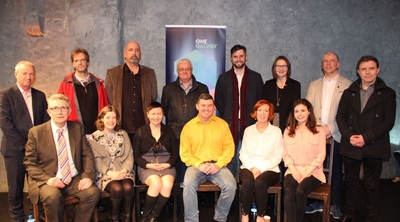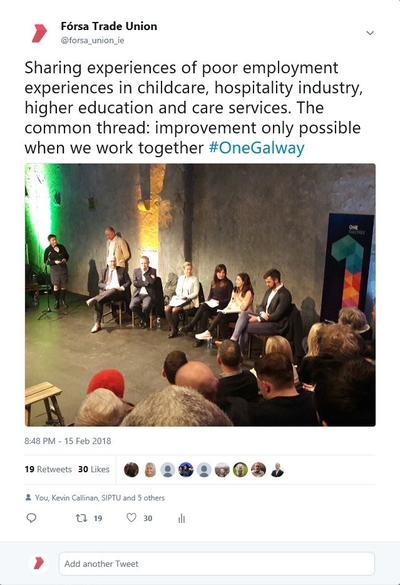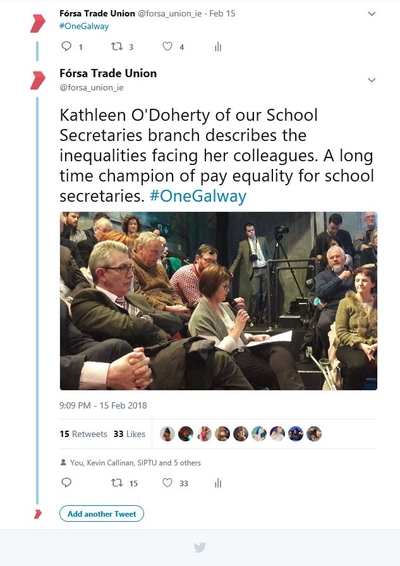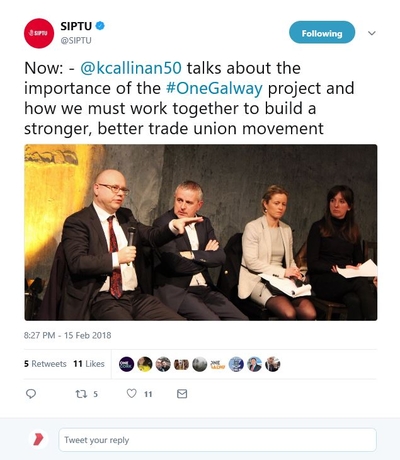Stage notes on addiction
Fórsa member Lisa Walsh readies for tour of new play
by Niall Shanahan
Love In The Wild is a new play written by Lisa Walsh, and opens next month at the Axis theatre in Ballymun. Lisa is a member of Fórsa and a social worker in child protection services. We met last week to talk about her inspiration for the play, its development from page to stage, and her desire to challenge the stigma of addiction.
Love In The Wild is a new play written by Lisa Walsh, and opens next month at the Axis theatre in Ballymun. Lisa is a member of Fórsa and qualified as a social worker as a mature student in 1999. She is currently working in child protection having previously worked as a medical social worker and an addiction worker.
We met last week to talk about her inspiration for the play, its development from page to stage, and her desire to challenge the stigma of addiction.
“The play is a one-man show about a man called Ger Duffy. He’s from Ballymun on Dublin’s north side. He’s on a methadone programme and he’s journeying through addiction and through big changes in his life.
“He has a strong connection to wildlife and nature, which helps explain how he sees the world, a way that’s quite different to how most people see it.
“The play is about love, it’s about judgment but hopefully it’s also about redemption. He’s not the stereotype of an addict, there are many layers to Ger and many layers to his story,” Lisa explained.
Inspiration
Ger’s experience was informed and inspired by Lisa’s work in addiction services over the last 20 years. While taking part in a creative writing course five years ago, Lisa recalled a story she’d heard about one addict’s experience of visiting Ballymun swimming pool 20 years previously.
“The swimming pool was a huge feature of life for anyone who grew up in Ballymun. Swimming and Chester slices - the cakes we had after we went swimming – were a big part of the Ballymun childhood.
“He went back as an adult for a swim but he left because he became very self-conscious of being - as he called himself - a ‘junkie’. It stayed with me and came back to me when I started writing,” she said.
The play has toured in a number of addiction centres in Dublin. Lisa said the response to those performances helped to inform the development of the play. “One man told me ‘We’ve all had that walk of shame, where we were walked out of places, security man would come over and put his hand on your shoulder.’ When he described that I knew we were on to something, because it’s trying to give a voice to that experience.”
Lisa said it made her think about Ballymun and the experience of stigma. “I grew up with a lot of stigma myself, my mam had addiction problems. When I started to write lots of things came back to me, like my experience of being a little girl with my mam, and the way people treated her, and later looking at the experience of people when I worked in addiction services. It’s why I was drawn to social work in the first place.”
Love in the Wild is performed by Anto Seery, directed by Peter Sheridan and produced by Sheila & Peter Sheridan.
The play opens in the Axis theatre in Ballymun on Thursday 8th March (International Women's Day) and will tour throughout March in a number of Dublin venues.
Watch the trailer here.
More information on dates, venues and booking here.

Love in the Wild is performed by Anto Seery
 |
|
The time for job evaluation is now
Further delay will hit staff morale, increase the pressure on service delivery to a critical point, and escalate the risk of industrial action – something that is now under active consideration by our Institutes of Technology branch.
by Kevin Callinan, deputy general secretary, Fórsa
Job evaluation assesses the skills and responsibilities required of a particular post, rather than the individual performing it. The process measures whether or not a specific post is correctly graded. Fórsa secured an agreement for job evaluation in higher education in 2015. Three years on, there’s still no movement, but the Department of Education and Skills can no longer afford to keep its head in the sand.
Job evaluation assesses the skills and responsibilities required of a particular post, rather than the individual performing it. The process measures whether or not a specific post is correctly graded. Fórsa secured an agreement for job evaluation in higher education in 2015. Three years on, there’s still no movement, but the Department of Education and Skills can no longer afford to keep its head in the sand.
When the Lansdowne Road Agreement was being negotiated in 2015, discussions took place between unions representing education workers and the Department of Education and Skills, under the auspices of the Labour Relations Commission (LRC).
One of the agreed items that emerged from that process was a commitment to authorise job evaluation exercises for library, clerical, administrative and support grades in the higher education sector.
It also provided for consultation between management and staff to take place before the commencement of any job evaluation exercise, and it was left open to both management and unions to put forward their respective business case to the department, seeking authorisation to conduct a job evaluation process.
Managing change
It’s been routinely acknowledged by successive ministers - and by senior civil and public servants - that this sector has undergone enormous change.
Anyone working in the higher education sector will attest to the need for such a process. Since 2008, the sector has seen an increase of over 30% in the number of students enrolled. In the same period staff numbers have fallen by 12%, due largely to the moratorium on recruitment that applied during the economic crisis.
By this measure, we can confidently state that the increase in productivity is more than 25%, while student numbers continue to grow in line with population growth and an accelerated demand for higher education places.
The sector has, up to now, relied on the goodwill and dedication of its staff. They’ve taken on additional workloads and responsibilities in order to protect the delivery of a quality service to students and staff. The pressure on administrative, library, and student support staff is reaching a critical point.
Agency
The growing pressure on these workers has been exasperated by the non-filling of posts in recent years, leading to the point where some posts were filled by agency staff on a temporary basis.
While unions had little choice other than to tolerate this in the short term, it’s a situation that’s no longer acceptable to us.
There is now an overwhelming, and entirely reasonable, demand from our members for the promised job evaluation scheme to be implemented without delay. They have waited long enough.
The continuing lack of progress risks the erosion, or in some cases even the collapse, of the efficient running of our higher education institutions, and the quality education they deliver to students.
For this reason, I’ve brought the matter to the attention of the Education Sector Oversight Group (ESOG), which oversees the terms of national agreements in the sector. This follows continuing pressure on senior officials and the Minister for Education and Skills, Richard Bruton, to break the logjam.
Pent-up demand
The recently reactivated job evaluation scheme in the health sector should serve as a caution to the Department of Education and Skills.
An eight-year suspension of the job evaluation scheme led to a large backlog of existing and potential applications from workers who have taken on substantial extra responsibilities, as clerical and admin staff numbers fell dramatically during the crisis.
Fórsa officials working in the health sector have been encouraged by the high number of applications to the reactivated scheme, which opened last year on foot of the union’s campaign. And while the success rate has so far been high, the waiting times for completion of the process are significant due to huge pent-up demand.
It’s time for the department to take its head out of the sand, and address the critical delay in getting a job evaluation scheme activated in higher education. Further delay will hit staff morale, increase the pressure on service delivery to a critical point, and escalate the risk of industrial action – something that is now under active consideration by our Institutes of Technology branch.
The sector is now, once again, deep in preparations for a further phase of seismic change, through the creation of new technological universities. If the department fails to act soon, all of this good work will be undermined by its failure to ensure our higher education institutes are staffed appropriately.
Nobody scores points for snatching defeat from the jaws of victory.
Fórsa meets Pay Commission
by Bernard Harbor
The Public Service Pay Commission (PSPC) says it has received a large number of submissions from unions on the issue of civil and public service recruitment and retention issues. These include submissions from Fórsa on problems in the civil service and among health and social care professionals.
The Public Service Pay Commission (PSPC) says it has received a large number of submissions from unions on the issue of civil and public service recruitment and retention issues. These include submissions from Fórsa on problems in the civil service and among health and social care professionals.
At a recent meeting with unions and officials from the Department of Public Expenditure and Reform (DPER), the PSPC said it had now sought submissions from public service employers. It has also commissioned independent research.
The Commission says it is not contemplating oral presentations at this stage, but it may seek clarification of aspects of the submissions it has received.
Last November, the PSPC issued a written statement setting out its approach to the work. It aims to report on issues relating to nursing, consultants and junior doctors by the end of June 2018, and to report on other staff groups outlined in its initial report by the end of this year.
In a related development, the finance minister ruled out the introduction of Dublin allowances when he spoke to the Oireachtas finance committee last week. Paschal Donohoe told the committee that staff retention was a bigger problem than recruitment, particularly in the capital.
Read the PSPC statement of approach here.
Trade unions and students launch One Galway
The project is a collaborative initiative comprising trade and student unions operating in the Galway area.
by Niall Shanahan
The ONE Galway initiative was launched last week (Thursday 15th February) with a packed house at the Mick Lally Theatre in Galway City.

The ONE Galway initiative was launched last week (Thursday 15th February) with a packed house at the Mick Lally Theatre in Galway City.
The project is a collaborative initiative comprising trade and student unions operating in the Galway area, supported by the Irish Congress of Trade Unions and the Galway Council of Trade Unions.
Fórsa deputy general secretary Kevin Callinan, who was one of the speakers at the event, explained: “The aim of the project is to foster a deeper engagement and collaboration between trade unions, student unions and community groups at workplace and societal levels to organise, campaign, educate and communicate with workers and the wider community.
“Building on the successful model established by the ONE Cork initiative, launched in 2016, ONE Galway is about organising workers, their families and communities to influence change and create a future within which there is access to decent work, decent pay and a decent standard of living for all,” he said.
Precarious work
The initial campaign focus for ONE Galway will be on precariousness and the exploitation of workers. The launch event featured a strong presentation on the issue from Dr Michelle O’Sullivan of the University of Limerick.
In her presentation, Dr O’Sullivan said “Precariousness, at its heart, is about uncertainty, and every problem, every poor outcome that workers have is because of uncertainty. Whether its hours, job or social insecurity, it’s about uncertainty.”
Dr O’Sullivan said many employers like to think of full-time, permanent jobs as something “of the past” and said she was “highly sceptical” when employers claimed that millennials were no longer interested in full-time, permanent jobs. She said it was important to challenge the claim that more secure working arrangements was a thing of the past.
Members of the audience joined the discussion to share their experiences of poor quality employment in childcare, the hospitality industry, higher education and in care services. Most of the contributions emphasised that improvement is only possible when people work together to secure them.
Campaigns
While similar to the Cork initiative, ONE Galway’s focus lies in a broader organisational engagement from the outset, where student unions are working alongside their trade union counterparts on campaigns such as housing needs, in addition to the campaign focus on precarious working.
Joe Cunningham, the general secretary designate of SIPTU, said: “ONE Galway will also work to better equip and increase the capacity of the trade union movement in Galway city and county to deal together with the many different challenges which face workers, particularly students, younger workers and those from our migrant communities.”
Kevin added: “It’s about consolidating the strength, resources and expertise locally of all these organisations and building a stronger network to improve living and working conditions and achieve significant gains for all workers through greater trade union and civic participation.”
  
Childcare price disparities grow
by Diarmaid Mac A Bhaird
The cost of childcare in Dublin is significantly higher than in other parts of the country, according to a new report by the union-backed Nevin Economic Research Institute (NERI).
The cost of childcare in Dublin is significantly higher than in other parts of the country, according to a new report. The study of the affordability of childcare in Ireland finds that full-time childcare for one child in Fingal costs 40% of a medium-earning worker’s net income.
Published by the union-backed Nevin Economic Research Institute (NERI), the study also found that full-time childcare for two children anywhere in Dublin costs more than the net income of a minimum wage earner.
The report examined part-time and full-time childcare costs for one-parent families with one child, and households with two children and two earners. Leitrim had the lowest average full-time childcare costs, while Dun Laoighaire-Rathdown is the most expensive.
Rural counties generally had much lower childcare costs, but the report warned that a national 4.3% rise in the price of childcare “masks” regional disparities.
The study also discusses the wider economic repercussions of the high cost of childcare in Ireland. The authors speculate that it has a detrimental effect on employment because it limits participation in the workforce.
“Ireland has some of the highest costs for full-time childcare as a proportion of disposable income in the OECD and one of the lowest spends on early childhood education as a proportion of GDP,” it says. It also suggests that increased spending on early childhood education results in long-term economic gains.
Last December, an advisory note on pay bargaining by ICTU’s Private Sector Committee highlighted “excessive” childcare costs. IMPACT – one of the three unions that recently merged to create Fórsa – had earlier made a budget submission, which called for increased spending on early childhood education following years of underinvestment.
Fórsa audio news bulletin
|
Survey results: Will a robot take your job?
In the last edition of the news bulletin we asked Fórsa members if they had concerns that a robot might eventually take over their job.
In the last edition of the news bulletin we asked Fórsa members if they had concerns that a robot might eventually take over their job.
Of those who took the survey, 51% of respondents said they weren't worried about their own job, but they were concerned for others, while 41% confidently stated that a robot could not do their job.
A few people have genuine concerns, with just 8% stating that their job is likely to be automated in the future.
The automation of work and the development of Artificial Intelligence (AI) technology is an issue of growing interest for Fórsa. Both developments present huge challenges for workers and unions, and we will bring you more on this in the coming months as part of the Fórsa Insights podcast series.
‘Room to improve’ on gender pay reporting - Eurofound
by Niall Shanahan
Report says evaluations in the four sample EU states point to a ‘bumpy ride’ in terms of gender pay gap reporting compliance.
As the focus on the gender pay gap continues, the European Foundation (Eurofound) has produced a report reviewing the experiences in four member states – Austria, Denmark, Sweden and Finland – based on their company-level gender pay reports and audits.
The report follows the European Commission’s announcement last November that further targeted measures to improve gender pay transparency may be needed at EU level.
Eurofound’s report says evaluations in the four sample states point to a ‘bumpy ride’ in terms of compliance, at least in the initial phase of rolling out the instruments in some countries. It says there’s “room for improvement in engaging employee representatives and in raising employees’ awareness.”
It says the success of any measures depend on “the extent to which the existence of unjustified gender pay gaps is acknowledged” by the various actors involved, and their willingness to engage in a meaningful dialogue and follow-up.
The Gender Pay Gap Information Bill 2017 was accepted by the Irish Government last October. The Bill, which was backed by a strong Fórsa campaign, assigns new powers to make mandatory information disclosure schemes, compelling businesses to publish details on what they pay men and women.
After extensive lobbying on the issue last year, Fórsa continues to actively engage with stakeholders within and beyond Leinster House. Discussions between Congress and the employer group Ibec are at an advanced stage. It is now expected that an agreed employer-union position will emerge from these talks.
Fórsa continues to engage with other unions and advocacy groups on the issue.
The Eurofound report is available here.
ETB shared services plans progress
by Niall Shanahan
Fórsa is continuing its engagement with the Department of Education and Skills on this year’s roll out of shared services in the education and training sector on behalf of members working in the education and training boards (ETBs).
Fórsa is continuing its engagement with the Department of Education and Skills on this year’s roll out of shared services in the education and training sector on behalf of members working in the education and training boards (ETBs).
The plan follows on from shared services proposals in the Public Service Reform Plan for 2014-2016, which looked at establishing shared services in areas such as HR, payroll, pensions, finance, IT and corporate services within the Department of Education and Skills and the wider education and training sector.
The latest plan includes specific plans for payroll and finance shared services for the 16 Education and Training Boards (ETBs).
The shared services unit is to be based in the former Liberty building in Blanchardstown, Dublin, Assistant general secretary Stella Griffin explained that, when fully operational, there will be 290 staff employed there as follows:
- Payroll (70)
- Finance (125)
- Higher education (85)
The balance of staff will be deployed in the corporate and information technology (IT) sections.
Stella said the next step is that two ETB payroll sections will transfer, followed by two phases of a transfer to shared services, with seven ETBs involved in each of the latter two phases.
“The process of staffing shared services is being carried out by seeking expressions of interest, in the first instance, from ETB staff. If they don’t get sufficient staff uptake from that process, the next call for expressions of interest will go to staff at the Department of Education and Skills, followed by the wider Civil Service, and finally to the public appointments service (PAS),” Stella explained.
Stella said a service management agreement will be drawn up between each ETB and the applicable shared service.
Fórsa FAQs
your questions answered
|
|
|